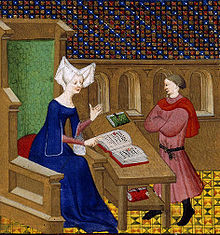Christine de Pizan
Appearance

Christine de Pizan or Christine de Pisan (11 September 1364 – c. 1430) was a Venetian-born French poet and proto-feminist philosopher, sometimes said to be Europe’s first female professional writer.
| This article about a philosopher is a stub. You can help out with Wikiquote by expanding it! |
Quotes
[edit]- Car en mon cuer porte couvertement
Le dueil qui soit qui plus me puet desplaire,
Et si me fault, pour les gens faire taire,
Rire en plorant et très amerement
De triste cuer chanter joyeusement.- For what would I be otherwise but sport,
In love with one who does not care for me?
I will hide pain in smiles, sooner than be
The common talk. It is a bitter art
To sing a happy song with a sad heart. - Rondeau "De triste cuer chanter joyeusement", line 8; Maurice Roy (ed.) Œuvres Poétiques de Christine de Pisan (1886) vol. 1, p. 154, as translated by by Sheenagh Pugh.
- For what would I be otherwise but sport,
- Seulete suy et seulete vueil estre,
Seulete m'a mon doulz ami laissiée,
Seulete suy, sanz compaignon ne maistre,
Seulette suy, dolente et courrouciée.- Alone am I, and alone I wish to be;
Alone my sweet love has left me.
Alone am I, without friend or mate,
Alone am I, mournful and angry. - Cent Balades, no. 11, line 1; Maurice Roy (ed.) Œuvres Poétiques de Christine de Pisan (1886) vol. 1, p. 12. Translation from Aliki Barnstone & Willis Barnstone (eds.) A Book of Women Poets from Antiquity to Now (1980) p. 203.
- Alone am I, and alone I wish to be;
Le Livre de la Cité des Dames (c. 1405)
[edit]- Translations and page-numbers are from Earl Jeffrey Richards (trans.) The Book of the City of Ladies ([1982] 1983).
- Cellui ou celle en qui plus a vertus est le plus hault, ne la haulteur ou abbaisement des gens ne gist mie es corps selon le sexe mais en la perfeccion des meurs et des vertus.
- The man or the woman in whom resides greater virtue is the higher; neither the loftiness nor the lowliness of a person lies in the body according to the sex, but in the perfection of conduct and virtues.
- Part I, ch. 9, p. 24.
- Si la coustume estoit de mettre les petites filles a l'escole, et que communement on les fist apprendre les sciences comme on fait aux filz, qu'elles apprendroient aussi parfaitement et entenderoient les subtilités de toutes les arz et sciences comme ils font.
- If it were customary to send daughters to school like sons, and if they were then taught the natural sciences, they would learn as thoroughly and understand the subtleties of all the arts and sciences as well as sons.
- Part I, ch. 27, p. 63.
- Quantes femmes est il qui usent leur vie au lien de mariage par la durte de leurs maris en plus grant penitence que se elles feussent esclaves entre les sarazins.
- How many women are there…who because of their husbands' harshness spend their weary lives in the bond of marriage in greater suffering than if they were slaves among the Saracens?
- Part II, ch. 13, pp. 118-19.
External links
[edit]- Ditie de Jehanne d'Arc - French w/ English translation
- Works by Christine de Pisan at Project Gutenberg
- Comprehensive bibliography of her works, including listings of the manuscripts, editions, translations, and essays. in French at Archives de littérature du Moyen Âge (Arlima)

